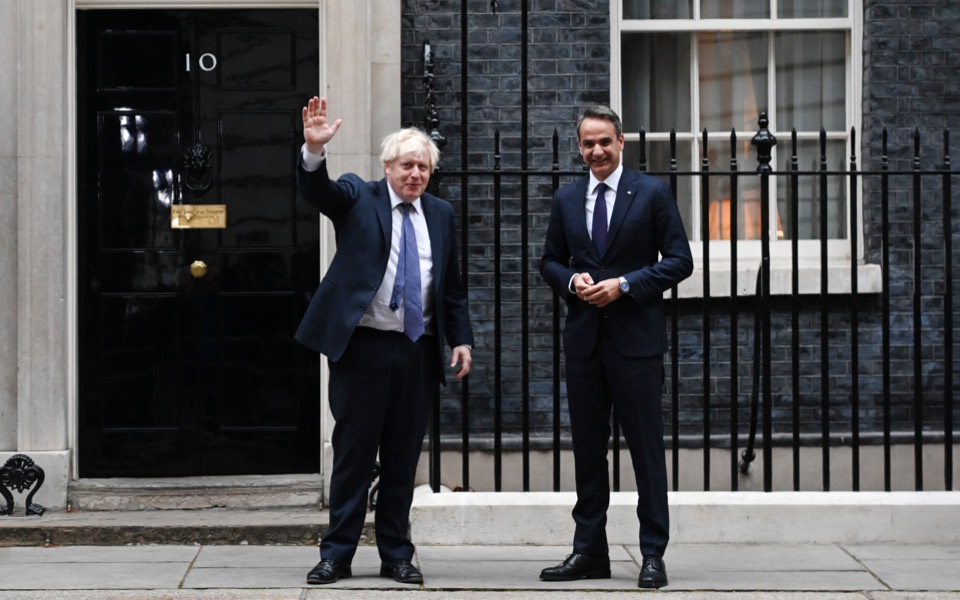Greece and ‘Global’ Britain must meet again

In a recent poll, Greeks were asked to identify which country they view as friendly to their interests and which they would prefer to invest in Greece. Among other big powers, Great Britain garnered only 7.6% and 9.6% of the participants’ votes, respectively. It is true that these answers do not present Greek-British relations in the best of lights. Nevertheless, the recent signing of the UK-Greece Strategic Bilateral Framework on inter alia security and trade is, undoubtedly, a step in the right direction and can pave the way to closer future cooperation. This is the first step of the “post-Brexit partnership” between Greece and the UK, as Foreign Minister Nikos Dendias stated.
Relations between the two countries are, undoubtedly, subtle and complex. On the one hand, there is one theme in their bilateral relations that has run ad nauseam since – at least – the 1980s, related to the return of the Parthenon Sculptures from the British Museum. And on the other, there are the thousands of tourists from the British Isles who flock to the islands of the Aegean every summer for vacations. Apart from those positive or negative facets, there are other, more pressing and critical issues at hand. For instance, one of the very intriguing questions tabled at the recent Greek-British Symposium at Pembroke College, Oxford, indicated how the two countries can cooperate in the contemporary fluid international environment.
We are not talking here about the establishment of a relationship between Greece and Britain; this already exists. Testimonials of common historical ties go back to the 18th century, when British nobles traveled across Greece during their Grand Tour, or when the Classical culture was transplanted and transcribed to Augustan literature by towering literary figures such as Alexander Pope and Jonathan Swift. Or, at the start of the 19th century, when Britain played an instrumental role in the liberation of Greece and the creation of the Modern Greek State. Also, recall the traditionally strong position and enduring credibility of the Greek-owned maritime industry in the City.
So, what matters most today is the reinforcement of this long-lasting partnership. Greek-British relations need to be further strengthened if they are to provide convincing answers to global challenges. The existing alliance can be buttressed by cooperation in fields like environmental policy, immigration and education, to name but a few.
Take climate, for example. This is a field where the two governments can work more closely together. The British government has made important pledges regarding climate change and recently hosted the 2021 United Nations Climate Change Conference (COP26). Greece, for its part, is promoting shared green European targets; for instance, the Greek government is pursuing a rapid break from the country’s dependence on fossil fuels, encouraging investments in energy sources with a small carbon footprint, and protecting its seas from pollution and overfishing. In recent decades – especially in the 2010s – Britain got a head start on decarbonization and is now in the position to provide technical advise and valuable expertise to Greece.
The fruits of cooperation are evident when it comes to education. Here, Britain and the European Union closely cooperate. One prominent example is the program “Una.Resin: Towards a Common Una Europa Research and Innovation Ecosystem,” which is directed by the Research Office of the University of Edinburgh in cooperation with eight other continental universities. Una.Resin is funded by the European fund Horizon 2020 and aims at developing new methods of research, promoting innovation and providing more funding opportunities to academics and students in fields like cultural heritage, artificial intelligence, health and international relations. Another Scottish university, Glasgow, now participates as an associate member of the CIVIS network, of which the University of Athens is also a full member. Last but not least, an ambitious program has been announced by the Greek Ministry of Education and the British Council regarding programs run jointly by British and Greek universities. This Greek-British strategic partnership in higher education can be a role model for other areas of policy, too.
On trade, Greece already exports technology and agricultural and pharmaceutical products to Britain, but there is great room for improving commodity trading and for further investments in Greece in infrastructure, healthcare, real estate, logistics and tourism.
Finally, on immigration, Greece is committed to safeguarding common European external borders while adhering to provisions of international law. One should recall that the “uncontrolled” migrant flows from Afghanistan, Pakistan and other countries sometimes runs along a straight line from the borders of Greece to Dover in southeastern England. During the last decade, Greece has developed high-skilled expertise when it comes to protecting both borders and human lives. Being maritime countries with extensive borders at sea, Greece and Britain face similar challenges on this front. So, they can share and exchange their insight, know-how and common intelligence, which will prove mutually beneficial in fields like humanitarian protection, border control and integration.
Overall, Greek-British relations are not only about the countries’ past; they are mostly about the present and the future. Greece and the United Kingdom can strengthen their cooperation and forge a strategic alliance in fields related but not limited to those mentioned here. Political leadership and a blossoming entrepreneurial and maritime presence both in Athens and London can bring the two countries closer together in facing some of the future challenges – the role of civic society is not to be underestimated in this mix. On the eve of AUKUS, “Global” Britain is seeking new alliances and Greece is opening to the world, forging new alliances and reinforcing old ones, ranging from the Middle East to Europe and the Atlantic. The timing is great for the two countries to meet again.
Ioannes P. Chountis is a policy adviser at the Hellenic Parliament and a PhD candidate at the University of Aberdeen.





